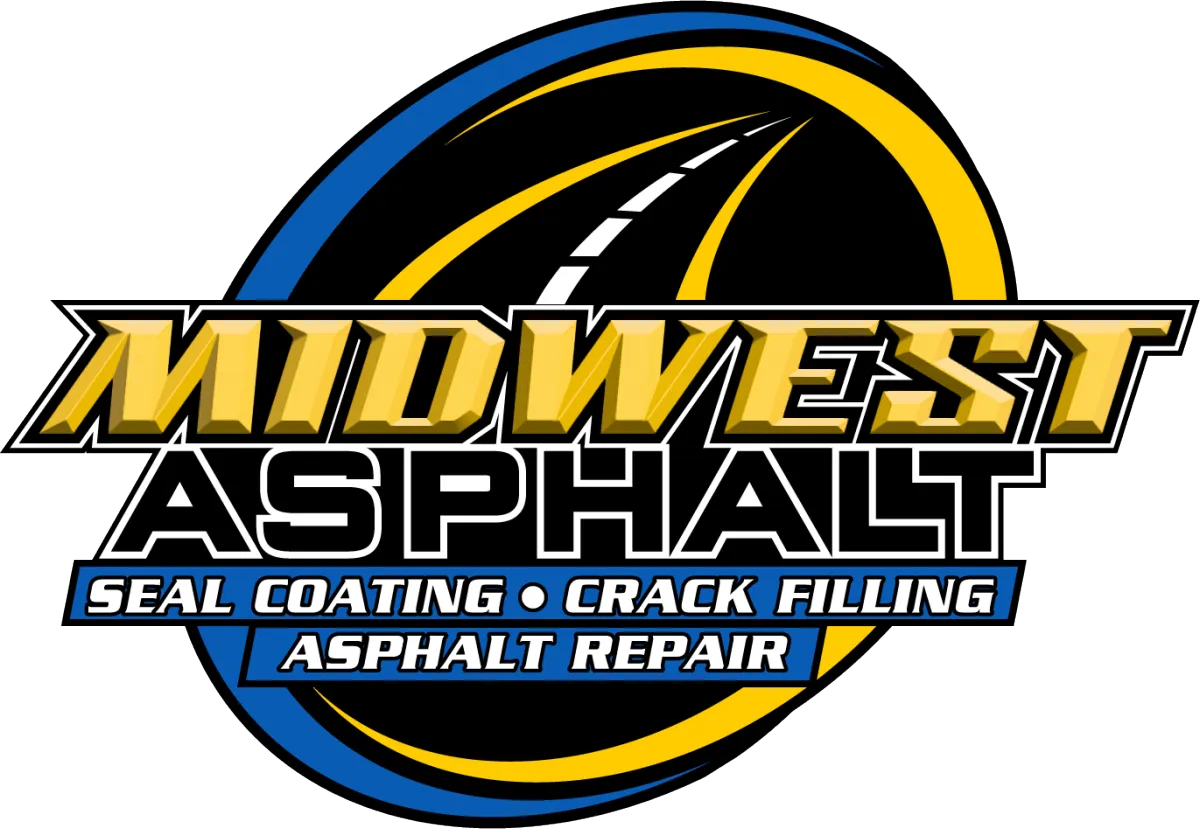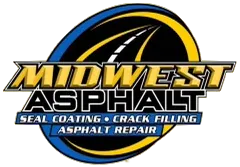715-710-1172

Midwest Asphalt Service Offerings
Sealcoating: Your Asphalt's Shield Against the Elements
What is Sealcoating?
Sealcoating is the application of a protective liquid coating over your existing asphalt surface. Think of it as sunscreen for your pavement – it creates a barrier that shields the asphalt from the damaging effects of weather, chemicals, and daily wear.
How Sealcoating Works
Our professional sealcoating process begins with thorough surface preparation. We clean the asphalt of all debris, oil stains, and vegetation, then fill any cracks or holes. Next, we apply a high-quality coal tar or asphalt-based sealer using professional-grade equipment to ensure even coverage. The sealer penetrates slightly into the asphalt surface while forming a protective top layer that typically takes 24-48 hours to fully cure.
Why Sealcoating is Critical for Asphalt Longevity
Unsealed asphalt is constantly under attack. UV rays from the sun break down the binding agents in asphalt, causing it to become brittle and gray. Rain and snow seep into tiny cracks and expand during freeze-thaw cycles, creating larger cracks and potholes. Oil, gasoline, and other automotive fluids chemically break down asphalt on contact.
Sealcoating prevents these problems by:
-Blocking UV rays that cause asphalt to oxidize and deteriorate
-Creating a waterproof barrier that prevents moisture infiltration
-Providing chemical resistance against oil and fuel spills
-Maintaining flexibility to accommodate temperature changes
-Restoring the rich, black appearance that enhances curb appeal
-Regular sealcoating can double or even triple your asphalt's lifespan, making it one of the most cost-effective maintenance investments you can make.
Signs Your Asphalt Needs Sealcoating
You should schedule sealcoating when you notice:
Asphalt has faded from black to gray or brown
Small cracks (less than 1/4 inch wide) beginning to appear
The surface feels rough or sandy when you walk on it
Water no longer beads up on the surface after rain
Oil stains are becoming more prominent or harder to clean
Timing matters: New asphalt should be sealed 6-12 months after installation, then every 2-3 years thereafter, depending on traffic and weather exposure.
Crack Filling: Stopping Small Problems Before They Become Big Expenses
What is Crack Filling?
Crack filling is the process of sealing cracks in asphalt surfaces with specialized materials designed to prevent water infiltration and further deterioration. It's a targeted repair that addresses specific problem areas before they can spread and cause more extensive damage.
How Professional Crack Filling is Done
Effective crack filling requires more than just squirting material into a crack. Our process starts with crack preparation – we clean out all debris, vegetation, and loose asphalt using specialized tools and sometimes heat. For larger cracks, we may need to rout them out to create clean, uniform edges that will hold the filler material properly.
We then select the appropriate filler material based on crack size and traffic loads. Hot-applied rubberized crack filler is used for most applications because it remains flexible and bonds well with the existing asphalt. The material is heated to the proper temperature and applied to slightly overfill the crack, then squeegeed level with the surrounding surface.
Why Crack Filling Protects Your Asphalt Investment
Cracks are asphalt's worst enemy because they allow water to reach the foundation layers beneath your pavement. When water infiltrates these base layers, several destructive processes begin:
-Freeze-thaw damage: Water expands when it freezes, widening cracks and creating new ones
-Base erosion: Water washes away the supportive materials under your asphalt
-Subgrade weakening: Moisture weakens the soil foundation, leading to settling and more cracking
-Accelerated deterioration: Once water gets underneath, the entire pavement structure begins to fail
Crack filling stops this process by preventing water infiltration, maintaining the structural integrity of your pavement's foundation layers.
When to Call for Crack Filling Services
Schedule crack filling immediately when you see:
-Cracks wider than 1/8 inch (about the thickness of a dime)
-Any crack that goes all the way through the asphalt (you can see the base material underneath)
-Cracks that are actively growing longer or wider
-Multiple small cracks forming a pattern (alligator cracking)
-Grass or weeds growing in cracks
-Water pooling in or flowing through cracks after rain
Don't wait: Small cracks double in size every year when left untreated. A $50 crack repair today can prevent a $500 pothole repair tomorrow.
Asphalt Repair: Restoring Structural Integrity
What is Asphalt Repair?
Asphalt repair encompasses a range of restoration techniques designed to fix structural damage to your pavement. This includes patching potholes, replacing damaged sections, addressing drainage issues, and rebuilding areas where the asphalt has failed completely.
How Professional Asphalt Repair Works
The repair method depends on the extent and type of damage:
-Pothole Repair: We remove all loose and damaged material, clean the area thoroughly, and check the base for stability. If the base is sound, we fill the hole with hot asphalt mix and compact it to match the surrounding surface level. For deeper holes or unstable bases, we may need to rebuild the foundation layers first.
-Infrared Repair: For larger damaged areas, we use infrared heating equipment to soften the existing asphalt, remove damaged material, add new asphalt, and blend everything together for a seamless repair that bonds chemically with the surrounding pavement.
-Full-Depth Reconstruction: When damage extends through the entire asphalt thickness into the base layers, we excavate the failed area, rebuild the foundation with proper materials and compaction, then install new asphalt in lifts to match the surrounding pavement thickness.
Why Prompt Asphalt Repair is Essential
Damaged asphalt doesn't just look bad – it creates safety hazards and leads to accelerated deterioration of surrounding areas. Here's why quick action matters:
-Safety concerns: Potholes and raised areas can damage vehicles, cause accidents, and create liability issues for property owners.
-Spreading damage: Water infiltration through damaged areas weakens adjacent asphalt, causing the problem area to grow larger over time.
-Foundation protection: Addressing surface damage quickly prevents water from reaching and damaging the expensive base layers underneath.
-Cost escalation: Small repairs become major reconstruction projects when neglected. The cost difference can be 10-20 times higher when problems are allowed to spread.
Signs That Indicate Need for Asphalt Repair
Call for professional repair when you notice:
-Potholes of any size (even small ones will grow rapidly)
-Areas where the asphalt has sunken or raised significantly
-Large cracks (wider than 1/4 inch) or interconnected crack patterns
-Areas where you can see the base material through the asphalt
-Persistent drainage problems causing water to pond on the surface
-Areas where vehicles bottom out or where walking is difficult
-Sections that feel soft or spongy when you walk or drive on them
Emergency repairs needed for:
-Any hole deep enough to damage vehicle tires or undercarriages
-Areas with sharp edges that could cause tripping hazards
-Damage that affects drainage and causes water to flow toward buildings
The Bottom Line: Preventive Maintenance Saves Money
Regular maintenance through sealcoating, crack filling, and prompt repairs typically costs 25-30% of what complete asphalt replacement would cost, while extending your pavement's life by 15-20 years. The key is working with experienced professionals who understand local climate conditions and use quality materials applied with proper techniques.
At Midwest Asphalt, we've seen firsthand how proper maintenance transforms aging, deteriorating pavement into smooth, attractive surfaces that serve property owners well for decades. Don't wait until small problems become big expenses – contact us today for a professional assessment of your asphalt surfaces.
Contact Us Today for your Free Quote!

Serving:
Marshfield, WI and surrounding Locations.
HOURS
Monday - Friday
8am-5pm
715-710-1172
FaceBook
2026 All Rights Reserved | Midwest Asphalt LLC | Designed by Centaur Innovation